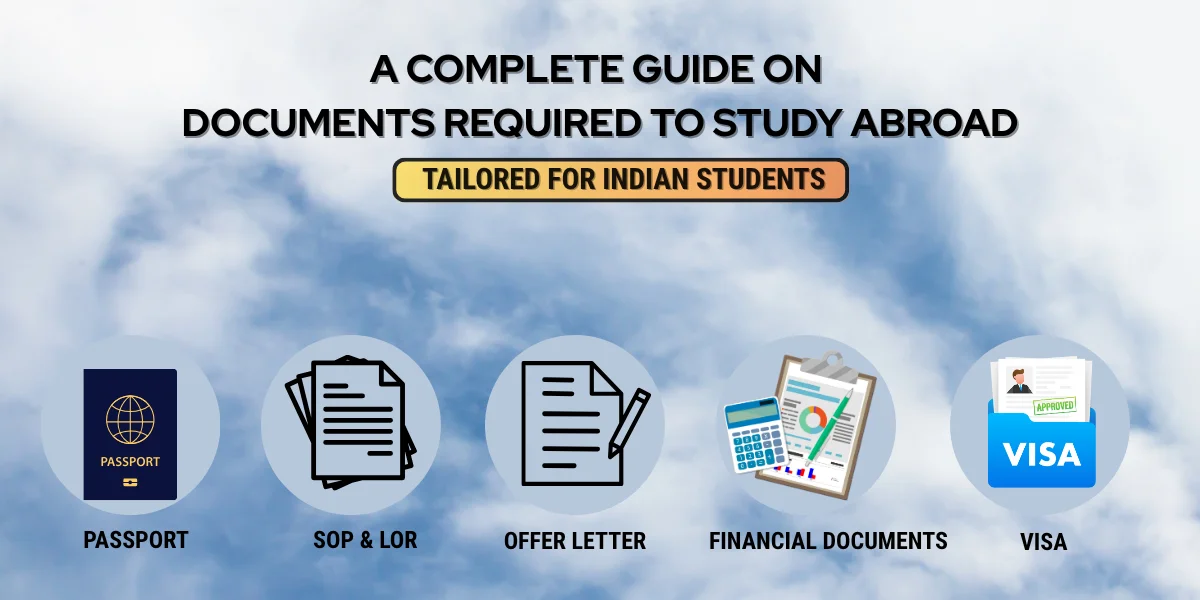Studying abroad is a transformative experience for Indian students aspiring for higher education in global universities. A crucial, often overwhelming, part of this journey is meticulously preparing the extensive set of documents required for your study abroad. This guide aims to simplify the process, helping you navigate through the essential paperwork from pre-application to post-visa stages, ensuring a smooth transition to your dream of higher studies abroad.
Introduction
The dream of pursuing higher studies abroad is a significant aspiration for many Indian students. It provides access to excellent education, varied cultures, and improved job outlooks. However, realizing this dream involves a comprehensive study abroad process, where meticulous document preparation plays a pivotal role. Understanding the documents required for abroad study is the first step towards a successful study abroad.
Pre-Application Stage Documents
Before you even begin to apply for foreign universities, certain documents and preparations are essential. These typically include:
- Valid Passport: This is your primary identification document and is crucial for international travel. Check your passport; it needs 6 more months of validity after your return date. This is one of the most fundamental documents required for study abroad.
- Academic Readiness: Research and identify the academic qualifications needed for your desired programs and universities for international students. This may involve understanding specific subject combinations or minimum scores. For those looking to study abroad after graduation, ensure your undergraduate degree certificates are ready.
- Standardized Test Scores: Depending on your chosen country and program, you may need scores from tests like IELTS, TOEFL, PTE (for English proficiency), or GRE/GMAT/SAT/ACT for graduate or undergraduate admissions. These scores are a critical part of your study abroad journey.
Also Read: Why is Career Counseling Key to Success in Studying Abroad?
Core Documents for University Applications
These are the foundational documents that form the backbone of your study abroad when you apply for foreign universities:
- Academic Transcripts/Mark Sheets/Report Cards: Official records of your academic performance from all previously attended institutions (school, college, university). These detailed courses were taken and grades received. For higher studies abroad, consolidated mark sheets and degree certificates (if completed) are often required. If transcripts are not in English, certified translations are mandatory.
- Statement of Purpose (SOP): A compelling essay outlining your academic goals, reasons for choosing a specific program and university, and how it aligns with your career aspirations. This is a crucial document for universities for international students to understand your motivation.
- Letters of Recommendation (LORs): Typically 2-3 letters from academic or professional references (professors, employers, mentors) who can vouch for your abilities, character, and potential. LORs add credibility to your study abroad application.
- Curriculum Vitae (CV)/Resume: A summary of your educational background, work experiences, skills, and achievements. Tailor it to highlight experiences relevant to the program you’re applying for.
- Research Proposal (for Postgraduate/PhD): If applying for research-oriented programs, a detailed proposal outlining your research topic, objectives, and methodology is required.
Financial Documents (Required for Education Loan to Study Abroad)
For Indian students, it’s vital to show enough money to study abroad, especially for sponsorships or getting an education loan. These documents prove that you can cover all expenses, including living expenses:
- Bank Statements: Provide bank statements, usually six months’ worth, proving you have funds.
- Loan Approval Letters: If you are securing an education loan to study abroad, official approval letters from the bank are essential.
- Affidavit of Support: A notarized statement from your sponsor (usually parents) confirming their financial support for your education, often accompanied by their income proof and assets.
- Scholarship Letters: If you are focused on securing a scholarship for studying abroad, ensure you gather all official award letters, as these are crucial for both university and visa applications. This can significantly reduce your financial burden.
- Tax Returns: Relevant income tax returns might be required as proof of income for sponsors.
Student Visa & Immigration Documents
After receiving an admission offer, the next critical step is applying for the study abroad visa. The documents required for this stage are crucial:
- Valid Passport: As mentioned, this is indispensable.
- Visa Application Form: The specific form for the destination country’s embassy or consulate.
- Letter of Acceptance (I-20/DS-160 for USA): Official confirmation of admission from the university. For the USA, the I-20 form (for F-1 visa) or DS-160 (for other non-immigrant visas) is required.
- SEVIS Fee Receipt (for USA): Proof of payment for the Student and Exchange Visitor Information System.
- Proof of Financial Resources: The same financial documents submitted for university applications will be needed here to demonstrate your ability to cover costs during your higher studies abroad.
- Medical Fitness Certificate & Vaccination Records: Many countries require health certificates and updated vaccination records.
- Police Clearance Certificate (PCC): Some countries may require a PCC to verify you have no criminal record.
- Visa Interview Appointment Letter: For countries requiring an interview, this letter is essential.
Post-Visa Documents
Even after obtaining your abroad study visa, there are a few documents to keep handy for your journey and initial days abroad:
- Admission Letter (Original): Keep this accessible.
- Accommodation Confirmation: Proof of where you’ll live in your destination country.
- Flight Tickets & Travel Itinerary: Your travel details.
- Health Insurance Policy: Proof of health coverage in the destination country.
Country-Specific List of Documents Needed for Studying Abroad
It is vital to remember that documents required for study abroad can vary significantly by country and even by university within the same country. For example, Germany requires an APS (Akademische Prüfstelle) certificate for Indian students, and some countries might demand specific attestation or apostille of documents by the Ministry of External Affairs (MEA) of India. Always verify the precise requirements of your target country and institution. An education consultancy can provide invaluable guidance on these country-specific differences.
Strategic Timeline for Document Preparation
Good planning is key to a smooth study abroad process:
- Start Early: Begin gathering documents required for studying abroad study well in advance, ideally 10-12 months before your intended intake.
- Create a Checklist: Develop a comprehensive checklist covering all academic, financial, and legal documents.
- Verify Requirements: Double-check the specific requirements of each university and the visa-issuing authority.
- Organize Copies: Keep both digital and physical copies organized. Ensure all physical documents are sent via secure delivery services if required.
Common Challenges
Students often face hurdles during the study abroad process. Some common challenges include:
- Missing Deadlines: Late submission can lead to rejection.
- Incomplete Applications: Failing to include all required attachments.
- Invalid or Expired Passports: Not renewing passports in time.
- Uncertified Translations: Submitting documents not in English without proper official translation and attestation.
- Document Authentication: Misunderstanding the attestation and apostille requirements.
Pro Tips for Students
Research the best countries to study abroad based on your field of interest, budget, and long-term goals, as this can affect both your application strategy and required documents.
- Seek Guidance: Utilize the expertise of an education consultancy. They can offer tailored advice and streamline your study abroad process.
- Proofread Meticulously: Ensure accuracy and consistency across all documents. Any discrepancies can cause delays.
- Keep Originals Safe: Always keep original documents secure and send only verified copies unless explicitly asked for originals.
- Financial Planning: Understand the full cost of study abroad for Indian students, including tuition, living expenses, and miscellaneous costs. Explore scholarships for Indian students and sponsorship to study abroad options.
- Prepare for Interviews: For visa interviews, be ready to articulate your study plans and financial preparedness.
How Innvictis Edutech Can Help You with Your Study Abroad Document Preparation
While I can’t provide specific details on how “Innvictis Edutech” can assist, typically, an study abroad consultancy like them plays a vital role in guiding Indian students through the entire study abroad process. They often provide services such as:
- Document Review: Helping you compile and review all necessary documents required for study abroad.
- Application Assistance: Guiding you through the study abroad application forms for universities for international students.
- Visa Guidance: Assisting with the abroad study visa application and interview preparation.
- SOP and LOR Support: Offering guidance on writing impactful Statements of Purpose and securing strong Letters of Recommendation.
- Financial Aid Advice: Providing information on scholarships for Indian students and education loans to study abroad options.
For Indian students, starting the study abroad journey is truly exciting. While the documents required for abroad study might seem daunting, a systematic and meticulous approach ensures a smoother study abroad application process. By understanding the requirements, planning strategically, and leveraging the support of resources like an education consultancy, you can confidently pursue your dream of higher studies abroad and apply for foreign universities.
FAQs
What are the most critical documents required for study abroad?
A valid passport, academic transcripts, Statement of Purpose (SOP), Letters of Recommendation (LORs), and proof of financial resources are universally critical.
When should I begin preparing my study abroad documents?
It is best to start 10-12 months before your target intake for plenty of time to gather, translate, and attest everything.
Do I need an education consultancy to help with my study abroad application?
While not strictly mandatory, an education consultancy can significantly streamline the complex process, especially for Indian students, by providing expert guidance on documents required for abroad study, university selection, and abroad study visa procedures.
Can I get sponsorship to study abroad?
Yes, many students receive sponsorships from family members or organizations. Additionally, exploring scholarships for Indian students is a great way to secure financial support.
What main financial documents do I need for a foreign study loan?
Typically, bank statements, income proof of sponsors, and official loan approval letters from financial institutions are required.
How do academic records differ from degree certificates?
Academic transcripts are detailed records of your courses and grades, while degree certificates are official proof of completing a particular level of study. Both are crucial for higher studies abroad.







